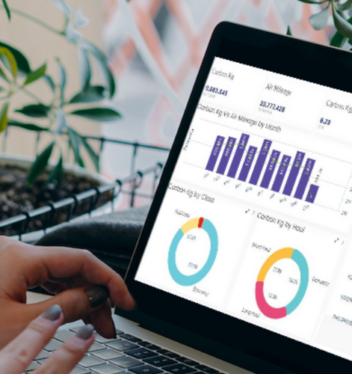Dispelling greenwashing: Navigating the heroes from the hype

Sustainability-focused marketing campaigns, whether from destinations to airlines, are all shouting about Net Zero, climate-emergency pledges and so-called Sustainable Aviation Fuel (SAF). But what’s the action amidst all this noise?
When it comes to aviation in the consumer sector, we’ve seen Skyscanner’s introduction of a Greener Choices option in their metasearch, while Google Flights now better clarifies carbon emission per flight. Innovations and developments are welcomed when they help travellers make more sustainable travel decisions, but greater behavioural change is still necessary, and lower-emission travel needs to be made more widely available and accessible.
Mark Corbett is the founder of carbon-tracking specialist Thrust Carbon. He points out that this is where business travel can get ahead of the game when it comes to sustainability. By working hand-in-hand with clients and embracing data generated by the likes of Thrust Carbon, TMCs can improve travel policies and traveller behaviours, genuinely driving progress towards Net Zero. This means corporate travellers having improved statistics to work with, allowing those at forward-thinking businesses to be able to adopt ‘carbon budgets’ and pragmatic low-carbon travel policies. Add to this fare options that are only sourced from greener travel providers, and there is real progress being made.
By partnering with experts such as Thrust Carbon, TMCs such as ATPI are able to fully understand all of the data, making it possible to provide clients with accurate carbon output measurements. This can, in turn, enable valuable analysis and quick-win recommendations for reducing emissions – taking into account factors such as aircraft type, travel class and even insights into where rail could replace air. Compared with mainstream leisure travel’s more broad-brush approach, travel managers booking flights, trains or cars for corporate travel can make better-informed decisions based on this useful and granular information. More accurate data allows for more transparent and meaningful reporting, as well as better decision-making — essential for any business since legislation on carbon reporting is coming thick and fast.
Without the help of a TMC partner, there’s a greater danger of falling for the hyped-up and unsubstantiated claims. As industry suppliers increasingly make grand sustainability commitments, it’s hard to distinguish between greenwash and genuine declarations. The challenge with so many of the boldest headline-grabbers is that these pledges are all about the future, with few promises representing significant change or progress today. For corporates seeking to make meaningful inroads to meet their sustainability targets, travel buyers must be able to differentiate between fact and fiction.
Sustainable Aviation Fuel — SAF — is a term thrown into a lot of conversations surrounding the greening of travel. These alternatives to traditional fossil fuels are a welcome advancement that marks a step in the right direction, but they are not the ultimate eco aircraft-powering solution. The goals set out by IATA surrounding the adoption of SAF are not aggressive enough to achieve the necessary changes, and the pace of positive change needs to be accelerated. SAF is currently only approved for use in up to 50 per cent of an aircraft’s fuel, with early-adopter airlines leading the way, yet the number of those actually embracing these fuels is minimal. Whether rightly or wrongly then, aviation – and by association its supply chain — has been accused of a delayed and inadequate response to the global climate crisis.
A recent innovation that has become increasingly popular amongst corporates has been the offsetting of carbon emissions through the purchase of carbon credits. As Ed Hewitt, director of Natural Climate Solutions at Respira highlights, carbon offsetting is an extremely valuable tool that both increases much-needed investment in long-term renewable energy and carbon sink infrastructure projects around the world, as well as allowing businesses to make progress towards achieving their Net-Zero obligations. Hewitt urges caution, however, emphasising that though undoubtedly an indispensable tool, carbon offsetting should not be seen as a panacea to all Net-Zero challenges. Direct emissions reductions must still be the priority, and offsetting should only be viewed as a supplement to those efforts. From both a business and an environmental perspective, it’s crucial that there is peace of mind that the money that is being invested in carbon credits is being used effectively that its impact is able to be monitored and measured. Working with reliable, experienced partners is therefore imperative in ensuring sustainable travel policies have a real, positive, tangible impact.
Looking at the end-to-end business travel journey – from policy to reporting and offsetting – the TMC is in prime position to advise travel managers on how to deliver real impact and change. Increasingly, the role being using its knowledge, expertise and trusted network of partners to inform, guide and assist buyers in making sustainable choices and navigating the hype. ATPI’s vision is to bring a robust sustainability consultancy to the managed travel sector by introducing the ATPI Halo division. By working with Respira and Thrust Carbon to deliver credible carbon-emissions reporting, monitoring and offsetting for its corporate travel clients, together, its aim is to better qualify every travel decision and encourage corporate clients to travel less – a first from a TMC – and to encourage the consideration of more sustainable options for all necessary travel. ATPI empowers corporates to place pressure on suppliers, such as airlines, rail, and car hire operators, to provide greener options at every step.








